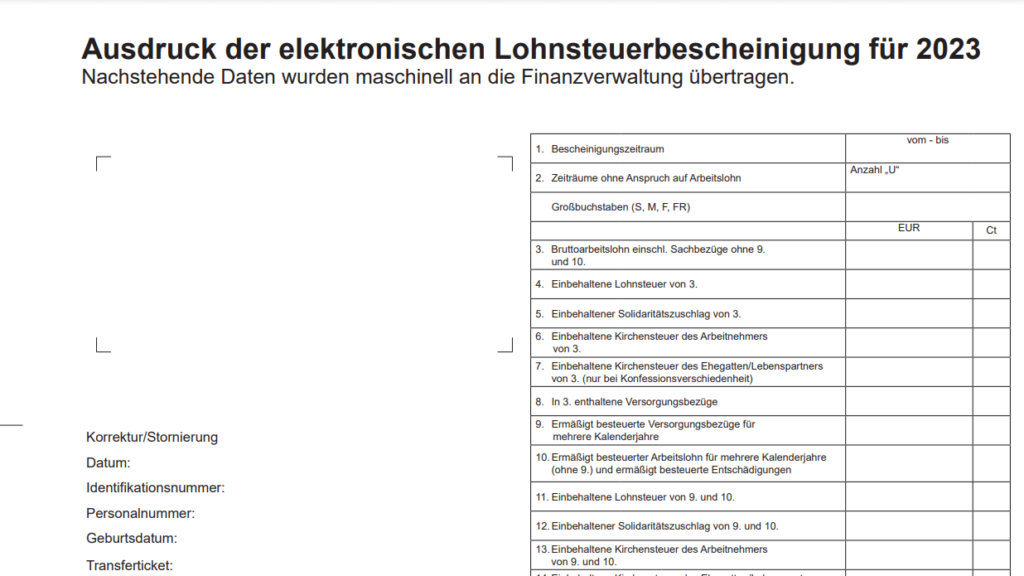
Key Facts: Home Office Deduction in Germany 2025
- Flat rate (Homeoffice-Pauschale): €6 per day worked from home, up to 210 days = €1,260 per year.
- No separate office room required for the flat rate. Kitchen table, sofa, or shared space works.
- Separate home office room (Arbeitszimmer): If you have a dedicated workroom used almost exclusively for work, you may deduct either actual costs (rent, utilities, depreciation) or a fixed €1,260 annual allowance.
- You cannot combine the flat rate and room deduction for the same period.
- Special case: If you permanently have no workplace provided by your employer (e.g., teachers preparing at home), you can claim the flat rate even on days you also travel to your workplace.
- Work equipment (desk, chair, laptop, etc.) can always be deducted separately.
1) What Changed Since 2023?
- The Homeoffice-Pauschale is now a permanent part of German tax law: €6 per day, max €1,260 per year. No need for a separate office.
- The rules for home office rooms (häusliches Arbeitszimmer) were clarified: if your workroom is the center of your professional activity, you can deduct either actual costs or a fixed €1,260 per year (monthly pro-rata if not full year).
- You must choose between flat rate and room deduction — no double claiming.
2) Home Office Allowance (Homeoffice-Pauschale)
2.1 Basic Rule
- €6 per calendar day you work from home.
- Maximum 210 days per year = €1,260.
- Applies if you mainly worked from home that day (more than 50% of working hours).
- No dedicated room required — working from the kitchen table is fine.
💡 Example: Maria worked 180 days from her flat in Berlin.
180 × €6 = €1,080 deduction.
2.2 Special Case — No Workplace Provided
- If your employer does not provide a permanent workplace (e.g., teachers, field staff), you can claim the flat rate even on days you also went to your school/office.
- In this case, you may combine the daily flat rate with commuting allowance for the same day.
💡 Example: A teacher spends mornings at school but always prepares at home in the afternoon → may claim commuting allowance + €6 flat rate on the same day.
2.3 Proof Required
- Keep a record of home office days (calendar, Outlook entries, employer confirmation).
- The tax office may request evidence if your claim looks unusually high.
3) Separate Home Office Room
3.1 Requirements
- A separate, enclosed room in your apartment/house.
- Used almost exclusively for work.
- A desk in your bedroom or a corner of the living room does not qualify.
3.2 Deduction Options
- If it is the main center of your work:
- Deduct actual costs (rent, utilities, insurance, depreciation for owned property) proportional to floor space.
- Or take the €1,260 fixed allowance (simpler).
- If not the main center of your work: no room deduction allowed. Use the flat rate instead.
3.3 Shared Rooms (Spouses / Roommates)
- Flat rate is person-based → each can claim separately.
- Room deduction is property-based → must be split according to ownership or rental share.
4) Additional Deductions: Work Equipment & IT
- Always deductible in addition to the flat rate or room deduction.
- Includes: desk, chair, shelves, lamps, monitors, laptops, software.
- Low-value assets (GWG): up to €800 net (€952 gross) can be fully deducted in the year of purchase.
- Computers & software: usually depreciated over 1 year (immediate full deduction possible).
5) Special Cases & Common Pitfalls
- Commuting + flat rate: Only allowed if no permanent workplace is provided. Otherwise, you must choose.
- Shared desks (desk-sharing): Does not count as “no workplace” — only temporary absence.
- Second household (double residence): Flat rate not allowed for days spent at second home near work (unless only partially deductible).
- Work corners: Valid for flat rate, not valid for room deduction.
- Multiple income types: Flat rate can only be claimed once per day, but split across employment/freelance income if needed.
- Employer reimbursement: Employers cannot reimburse the flat rate tax-free.
- Employee lump sum (Werbungskostenpauschale): The flat rate counts towards the €1,230 standard deduction; it only reduces tax if your total expenses exceed that.
6) How to Claim in Your Tax Return
- Employees: Report in Anlage N (work-related expenses) in ELSTER.
- Example entry: “180 home office days × €6 = €1,080”.
- Freelancers/Self-employed: Enter in Anlage EÜR (profit and loss statement).
- Attach supporting documents only if requested, but keep records ready.
7) Checklists
Proof Checklist
- Calendar/Excel sheet of home office days.
- Employer confirmation (if applicable).
- Receipts for equipment, rent, utilities (if claiming room costs).
Decision Flow
- Do you have a separate room used almost only for work?
- Yes: Is it the main center of your work?
- Yes → Deduct actual costs OR €1,260 allowance.
- No → Not deductible; use flat rate.
- No: Use flat rate €6/day.
- Yes: Is it the main center of your work?
8) Calculation Examples
- Example A — Employee (hybrid worker):
160 days home office × €6 = €960 deduction. - Example B — Teacher (special case):
200 days (school + preparation at home).
Flat rate = 200 × €6 = €1,200.
Plus commuting allowance for 200 school days. - Example C — Freelancer with office room (20% of flat):
Rent €1,200/month → €14,400/year.
20% share = €2,880 deduction.
(May choose €1,260 instead if simpler).
9) ❌ Common Mistakes to Avoid
- Claiming both flat rate and room deduction for the same period. You must choose one method.
- Deducting a “work corner” as a full office room. For room deduction, the space must be an enclosed, separate room used almost exclusively for work.
- Forgetting proof of home office days. Keep a calendar or digital log to back up your claim.
- Double claiming costs. If your employer reimburses you for certain equipment, you cannot also deduct it.
- Assuming Sundays or short workdays don’t count. If you worked primarily from home on those days, they count toward the flat rate.
- Ignoring the employee lump sum (€1,230). If your total expenses don’t exceed this, the flat rate won’t reduce your tax — but it’s still worth recording in case your other deductions add up.
10) FAQ
Q: Can I claim both the flat rate and commuting allowance on the same day?
👉 Only if you have no permanent workplace (special case).
Q: Does a desk in the living room count as a home office?
👉 Yes, for the flat rate. No, for the room deduction.
Q: Can I deduct furniture?
👉 Yes — desks, chairs, lamps = work equipment. Separate from flat rate.
Q: Do Sundays or holidays count if I worked?
👉 Yes — it’s per calendar day worked, not weekdays only.
Q: Does my employer’s reimbursement affect my claim?
👉 Employers cannot reimburse the flat rate tax-free. If they pay allowances, those are taxable.


